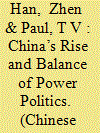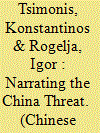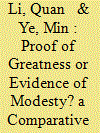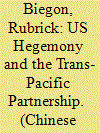|
|
|
Sort Order |
|
|
|
Items / Page
|
|
|
|
|
|
|
| Srl | Item |
| 1 |
ID:
175838


|
|
|
|
|
| Summary/Abstract |
The post-Cold War international system, dominated by the United States, has been shaken by the relative downturn of the US economy and the simultaneous rise of China. China is rapidly emerging as a serious contender for America’s dominance of the Indo-Pacific. What is noticeable is the absence of intense balance of power politics in the form of formal military alliances among the states in the region, unlike state behaviour during the Cold War era. Countries are still hedging as their strategic responses towards each other evolve. We argue that the key factor explaining the absence of intense hard balancing is the dearth of existential threat that either China or its potential adversaries feel up till now. The presence of two related critical factors largely precludes existential threats, and thus hard balancing military coalitions formed by or against China. The first is the deepened economic interdependence China has built with the potential balancers, in particular, the United States, Japan, and India, in the globalisation era. The second is the grand strategy of China, in particular, the peaceful rise/development, and infrastructure-oriented Belt and Road Initiative. Any radical changes in these two conditions leading to existential threats by the key states could propel the emergence of hard-balancing coalitions.
|
|
|
|
|
|
|
|
|
|
|
|
|
|
|
|
| 2 |
ID:
175839


|
|
|
|
|
| Summary/Abstract |
Bilateral relations between China and the United States have evolved over the past two decades from the ‘same bed, different dreams’ of the 1990s when, despite different interests and perceptions, globalisation and multilateralism drew them closer, to the potential ‘different beds, same nightmare’ scenario where their economies draw further apart and their governments are locked in hegemonic rivalry. Drawing on Wendtian constructivism and cognitive psychology, this article proposes a systematic and dynamic theoretical framework and a review of the evolution of Sino–US relations to explain how and why the above changes happened. We subdivide Sino–US relations since the early 1990s into five periods that describe the United States’ China strategy in four aspects and China’s US strategy in three aspects. Our findings are that the United States’ China strategy has changed dramatically while China’s US strategy has remained relatively stable, and that Sino–US relations from the early 1990s to mid-2010 were characterised by cooperation borne of strategic compatibility, whereas those ensuing were characterised by competition due to strategic incompatibility. We argue that rivalry between the two countries stems from their fundamentally different ideas, namely, Chinese statist nationalism and American liberal hegemony, and that gaps in perception have exacerbated the differences. Simply put, their ‘different dreams’ have led to the ‘same nightmare’.
|
|
|
|
|
|
|
|
|
|
|
|
|
|
|
|
| 3 |
ID:
175841


|
|
|
|
|
| Summary/Abstract |
This article unpacks the discursive construction of a European ‘China Threat’ narrative by European think tanks. We theorise think tanks as crucial actors in the securitising process, especially at the initial stages where ideas and reference frames are formed. Despite having no decision-making authority, think tanks participate as securitising actors in the process of idea formation and bidding, articulating a securitised frame of reference for policy makers. In the case of EU–China relations, we observe an emerging congruence between think tanks and policy makers that engage in a non-linear construction of a ‘China Threat’ policy frame. In this article, we review key think tank reports that are circulated through official EU policy channels and deconstruct the assumptions behind the ‘China Threat’ discourse. We first argue that, analytically, their securitising attempt is characterised by a distorted representation of Chinese economic activities abroad, including those falling under the Belt and Road Initiative. Second, politically, this narrative produces a distorted notion of European politics where pluralism is weakness and disagreement dissent, promoting a view of the EU where ‘responsible’ core countries must contain the periphery’s ‘opportunism’. Third, we contend that despite defending ‘Europeanness’ as the epitome of human rights and democracy, the securitisation of Chinese FDI rests on othering practices that risk undermining those very ideals. By identifying the problematic undertones of this securitising effort, we call for a fact-based and pluralistic debate on the challenges of Chinese investment and financing for European economies and societies.
|
|
|
|
|
|
|
|
|
|
|
|
|
|
|
|
| 4 |
ID:
175842


|
|
|
|
|
| Summary/Abstract |
Any serious discussion about the consequences of China’s rise must start with a systematic and rigorous assessment of China’s actual influence and status in the international system. In this article, we examine a widely used indicator in the debate about China’s international status. Although many existing studies see China’s active participation in United Nations (UN) Peacekeeping Operations as incontestable evidence of China’s great power status, others contend that it signifies the status of only a middle power. We posit that China’s policy behaviour should be evaluated in a comparative manner, and from a dynamic perspective. After comparing the patterns and features of China’s personnel contributions with that of 20 other major countries in the world, we find that China’s behaviour is more similar to that of developing ‘middle powers’, such as Turkey, India, and Brazil, as opposed to established ‘great powers’ such as other permanent members of the UN Security Council or traditional ‘western middle powers’.
|
|
|
|
|
|
|
|
|
|
|
|
|
|
|
|
| 5 |
ID:
175840


|
|
|
|
|
| Summary/Abstract |
This article provides a critical analysis of the agency of the United States in the Trans-Pacific Partnership (TPP). Building on neo-Gramscian theory, it contextualises the US decision to withdraw from the TPP as an expression of hegemonic crisis. Through an examination of the strategic and geoeconomic logics and objectives of the trade agreement in US foreign economic policy, it maintains that the TPP was intended primarily to expand the structural and consensual power of the United States in the international political economy. Partly an attempt to kick-start a stalled neoliberal agenda, the TPP was also an effort to respond to China’s growing influence in trade governance. The article argues that, despite the revival of the TPP in the form of the Comprehensive and Progressive Agreement for Trans-Pacific Partnership, the inability of elite networks in the United States to implement the original accord is illustrative of a crisis of hegemony driven largely by the collapse of the ‘common sense’ in favour of economic globalisation.
|
|
|
|
|
|
|
|
|
|
|
|
|
|
|
|
|
|
|
|
|